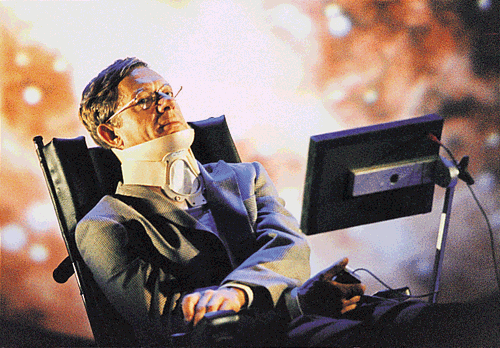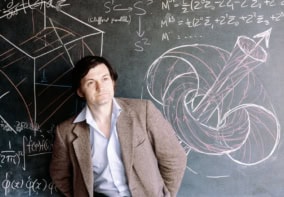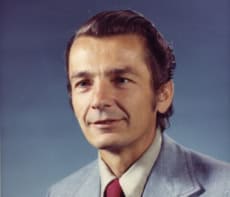God and Stephen Hawking
Robin Hawdon
6 September 2000, Oxford Playhouse

Robin Hawdon, the author of this new play staged by the Theatre Royal, Bath, is on the defensive from the start. His notes in the programme begin with the following admission: “I am well aware that, in writing this play, I am laying myself open to assault from all sides.” He expects flak from scientists, theologians and philosophers. He has already received a lot from Stephen Hawking, who has objected strongly to the play. He regards it as a “deeply offensive” invasion of his privacy, and has dismissed it as “a stupid and worthless play” (Physics World August p8).
This is perhaps too harsh for a play that is clearly intended as serious. Talking to several non-scientists buttonholed at random during the interval of the performance that I attended in Oxford, I discovered that they found much of the material it covered absorbing. But it is flawed and compares badly with two very successful plays about physics and physicists – Friedrich Dürrenmatt’s Die Physiker and Michael Frayn’s recent Copenhagen (Physics World July 1998 pp35-36).
Perhaps the strongest criticism will come from a quarter Hawdon did not anticipate: drama critics. The play is severely lacking in dramatic content. In fact, it is not really a play at all, but a mixture of documentary about Hawking’s life, popular-science lectures and philosophical debate. There are only three main characters – Hawking, played by Stephen Boxer, Hawking’s first wife Jane (Teresa Gallagher) and God (Robert Hardy).
God does succeed dramatically when He is given the chance, which Hardy takes with evident relief. Like Hawdon, God too is on the defensive, but for a different reason. Science and scientists, epitomized by Hawking, are threatening to make Him redundant. He is presented as mischievous and engaging, rather like Mephistopheles in Goethe’s Faust in fact, and he sets out the argument right at the start: does He, God, exist?
As shown in the play, He certainly has one divine attribute – He is omnipresent, since God and Robert Hardy also play the parts of about 12 other people who enter Hawking’s life. This is often quite a good device, since it allows effective asides when Hardy swaps persona from an assumed role back to being God, but at other times it wears thin.
As a debate about the possibility of belief in God in the light of the findings of science, I felt that God and Stephen Hawking succeeded quite well. The two sides of the argument are fairly presented, and Hawdon has some good lines for both believers and unbelievers. But I was disappointed at the way the science was put across and found the representation of Hawking’s life, including quite private aspects, problematic.
Let me start with the science. Hawdon clearly has a great desire in this play to get across his own fascination with the workings of the universe and employs two devices to do so. First, innumerable colour pictures – of the Earth seen from space, spiral galaxies, mathematical equations and stained-glass windows – are projected onto a huge round screen at the back of the stage throughout the play. Second, the development of the action is often interrupted for what might be called popular-science primers.
The first of these – given by the famous Hawking voice synthesizer – is the best and most authentic. But it is followed by several others, some of which are simply done by God standing at a lectern and reading from notes, while different pictures that are meant to evoke the content are projected onto the screen. This rapidly gets boring, and the science is seldom sharp and sometimes garbled. Meanwhile, the scenes in which Hawking is shown with other scientists, for example in working discussions with Roger Penrose, simply do not ring true.
Opinions will differ on whether it is acceptable to put living people and relatively intimate details of their family life on stage. I would not, and I can certainly understand Hawking’s annoyance. However, I will only comment on what seem to me to be theatrical difficulties. Can it work as drama? Margaret Thatcher’s fall from power was intensely dramatic, but the television dramatization that followed relatively soon afterwards was a pallid affair. Similarly, the facts of Hawking’s life – Jane’s intense Christianity, his own agnosticism and the break-up of their marriage – could have been the stuff of high drama, but they did not work here on stage.
To achieve this would have required considerable artistic licence and a much more robust treatment. With dead subjects, an author can take almost any freedom for the sake of a good plot. Here, Hawdon was inevitably inhibited. And although he did quite enough to offend Hawking, it meant (for me at least) that the personal drama did not enhance the philosophical debate in the way one would have liked. Yes, Hawking’s physical handicaps were used to cast doubt on God’s goodness, but here, as in all the personal aspects in this play, one was presented with (generally) restrained fly-on-the-wall documentary, not theatre.
In fact, the irony was that nearly all of the real people shown in the play came across as cardboard creations or even cartoon characters (Einstein, for example, woefully lacked gravitas) and only God had the freedom to be a real person. Hardy was invariably at his best when playing Him. Stephen Boxer, as Hawking, had an especially difficult task – making a person denied most normal means of expression expressive. This again makes me wonder if Hawking’s life is the stuff of true drama, even if many people who see this play will come away deeply impressed by his fortitude and achievement.
* God and Stephen Hawking continues at the Richmond Theatre, London, from 2-7 October (tel. +44 (0)20 8940 0088) and at the Yvonne Arnaud Theatre, Guildford, from 9-14 October (tel. +44 (0)1483 440000)



